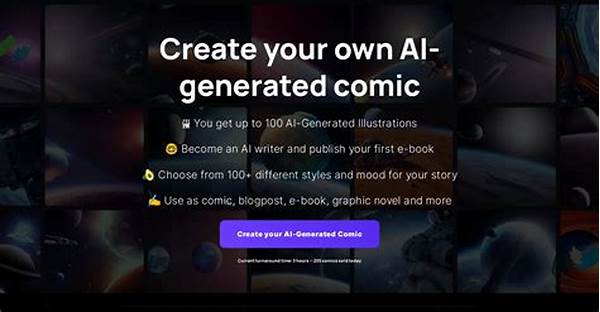In recent months, the internet has witnessed an explosive wave of creativity driven by the innovative use of artificial intelligence in generating comics. This fascinating trend has roots in both technological advancements and the ever-evolving world of digital content creation. But why are AI comic generators going viral? Let’s embark on a journey to explore this phenomenon, unraveling the engaging blend of technology, humor, and art.
Read More : Best Ai-powered Creative Suites Explained
The magic of AI-driven comic creation lies in its unique ability to democratize creativity. Imagine a tool that enables anyone, regardless of artistic skills, to bring their whimsical ideas to life in comic form. This is exactly what AI comic generators offer. These tools use sophisticated algorithms to analyze user input—be it text, prompts, or themes—and transform it into vibrant comic panels. Such efficiency saves considerable time and effort compared to traditional hand-drawn methods. Moreover, with AI comic generators becoming increasingly accessible and affordable, they’ve piqued the curiosity of both individuals and businesses looking for innovative ways to engage audiences.
Generating comics with AI isn’t just about convenience; it’s also about pushing creative boundaries. In a digital age where content saturation is a challenge, standing out requires a touch of novelty. The viral nature of AI comic generators stems from their ability to facilitate novel storytelling approaches, which fascinate audiences and encourage sharing. Enthusiastic digital artists, content creators, and brands are jumping on this bandwagon to produce comics that resonate with a diverse range of people, tapping into shared interests and cultural narratives. As user-generated content continues to dominate online platforms, AI comic generators are helping individuals and businesses remain relevant and creative in their communication strategies.
Innovations Fueling a Viral Trend
The technology behind AI comic generators continues to evolve, making them even more powerful and useful. Recent enhancements have included features such as style adaptation, where the AI can mimic different artistic styles, and contextual understanding, enabling deeper and more relevant storylines. These features entice users to experiment and push creative limits, fuelling the viral spread.
Now, let’s delve even deeper into why AI comic generators have captured the imagination of a global audience. By examining user experiences and the broader societal impact, we will shed light on this digital marvel.
What Makes AI Comic Generators So Popular?
The virality of AI comic generators can be attributed to several compelling factors. First, there is the intrinsic appeal of humor and visual storytelling, which resonate strongly with today’s digital audience. Humans have long been captivated by illustrated narratives, and AI tools automate the storytelling process, making it easier for anyone to craft entertaining and witty comics. Additionally, these generators allow for real-time feedback and iterations, empowering users to adjust their content dynamically.
User Testimonials and Stories
Many users have shared their experiences with AI comic generators, revealing the blend of surprise and delight that accompanies the creative process. For example, Sarah, a freelance writer, used an AI comic generator to visualize a short story she wrote, transforming complex narratives into understandable yet amusing content. Her story echoed multiple others that highlighted the sheer joy of seeing ideas spring to life, provoking laughter and insights from readers. As these testimonials circulate, they further drive interest and engagement, explaining why AI comic generators are going viral.
Key Insights into the Trend
Here are some noteworthy aspects contributing to the viral trend of AI comic generators:
As this technological marvel continues to capture imaginations worldwide, businesses, educators, and individuals in various niches are starting to incorporate AI comic generators into their content strategies.
While AI comic generators are already captivating audiences, their potential for growth and evolution is vast. With ongoing advancements in machine learning and AI technology, the future holds exciting possibilities. These future developments may include enhanced personalization, increased integration with virtual reality spaces, and more refined linguistic context. This adaptability ensures that AI comic generators continue to entertain and inspire, offering endless opportunities for creative expression.
In conclusion, the viral phenomenon of AI comic generators is a testament to the power of technology to transform traditional media. By tapping into widespread human interests—art, humor, and storytelling—these tools have carved out a significant niche in the digital content sphere. As these technologies continue to evolve, their impact on how we create and consume comics is poised to grow, forever changing the landscape of digital storytelling.


